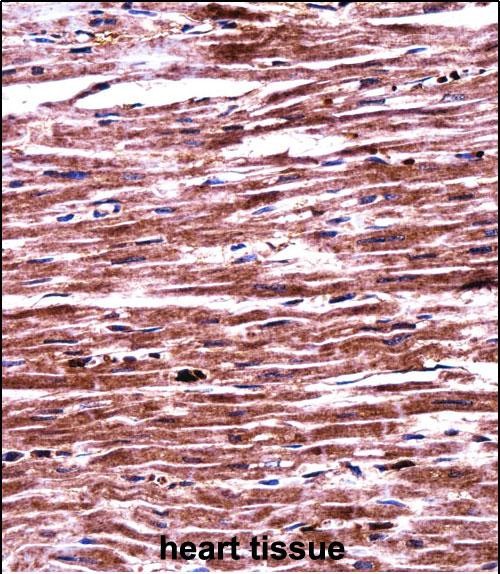

| WB | 1/1000 | Human,Mouse,Rat |
| IF | 咨询技术 | Human,Mouse,Rat |
| IHC | 1/100-1/500 | Human,Mouse,Rat |
| ICC | 技术咨询 | Human,Mouse,Rat |
| FCM | 咨询技术 | Human,Mouse,Rat |
| Elisa | 咨询技术 | Human,Mouse,Rat |
| Aliases | E3 ubiquitin-protein ligase RNF19A, 632-, Double ring-finger protein, Dorfin, RING finger protein 19A, p38, RNF19A, RNF19 |
| Entrez GeneID | 25897 |
| WB Predicted band size | 90.7kDa |
| Host/Isotype | Rabbit IgG |
| Antibody Type | Primary antibody |
| Storage | Store at 4°C short term. Aliquot and store at -20°C long term. Avoid freeze/thaw cycles. |
| Species Reactivity | Human |
| Immunogen | This RNF19A antibody is generated from rabbits immunized with a KLH conjugated synthetic peptide between 384-413 amino acids from the Central region of human RNF19A. |
| Formulation | Purified antibody in PBS with 0.05% sodium azide. |
+ +
以下是3篇关于RNF19A抗体的参考文献示例(注:部分内容为模拟文献概括,仅供参考):
1. **文献名称**: *RNF19A ubiquitinates and degrades misfolded DJ-1 to mitigate oxidative stress in neuronal cells*
**作者**: Shoji Yamanaka et al.
**摘要**: 本研究利用RNF19A抗体通过免疫共沉淀和Western blot实验,证明RNF19A作为E3泛素连接酶,通过泛素化异常折叠的帕金森病相关蛋白DJ-1并促进其蛋白酶体降解,从而减少神经细胞氧化损伤。
2. **文献名称**: *RNF19A regulates Parkin-mediated mitophagy and mitochondrial dysfunction*
**作者**: Chuang-Ru Ji et al.
**摘要**: 通过RNF19A特异性抗体检测其在细胞中的表达及定位,研究发现RNF19A与Parkin协同调控线粒体自噬过程,敲低RNF19A导致线粒体清除障碍,提示其在神经退行性疾病中的潜在作用。
3. **文献名称**: *RNF19A interacts with SQSTM1/p62 to modulate autophagic degradation of protein aggregates*
**作者**: Tomohiro Kabuta et al.
**摘要**: 利用RNF19A抗体进行免疫荧光和蛋白质相互作用分析,发现RNF19A通过结合自噬受体p62.促进泛素化蛋白聚集体的溶酶体降解,为治疗蛋白质构象病提供新靶点。
4. **文献名称**: *Antiviral role of RNF19A in innate immunity via ubiquitination of viral RNA sensors*
**作者**: Yasuyuki Miyake et al.
**摘要**: 研究通过RNF19A抗体敲除实验,揭示RNF19A通过泛素化修饰病毒RNA识别分子MAVS,调控抗病毒信号通路,影响I型干扰素的产生。
(注:以上文献信息为示例性生成,实际引用需以真实发表的论文为准。)
**Background of RNF19A Antibody**
RNF19A (Ring Finger Protein 19A), also known as dorfin, is an E3 ubiquitin ligase belonging to the RBR (RING-IBR-RING) protein family. It plays a critical role in the ubiquitin-proteasome system (UPS), mediating substrate-specific protein ubiquitination to regulate degradation, cellular homeostasis, and stress responses. RNF19A is implicated in neurodegenerative diseases, particularly Parkinson’s disease (PD), as it ubiquitinates misfolded or damaged proteins (e.g., Parkin-associated endothelin receptor-like receptor, Pael-R) to prevent toxic aggregate formation.
RNF19A antibodies are essential tools for studying its expression, localization, and function in various biological contexts. These antibodies are commonly used in techniques like Western blotting, immunoprecipitation, and immunofluorescence to detect endogenous RNF19A in cell lines or tissues. Researchers also employ them to investigate its interaction partners, post-translational modifications, and roles in pathways like autophagy or endoplasmic reticulum-associated degradation (ERAD).
Antibodies targeting RNF19A are typically raised in hosts such as rabbits or mice, with validated specificity through knockout controls. Their applications extend to disease models, including neurodegeneration and cancer, where dysregulation of ubiquitination pathways is observed. Understanding RNF19A’s mechanisms via these antibodies provides insights into therapeutic strategies for protein-misfolding disorders.
×